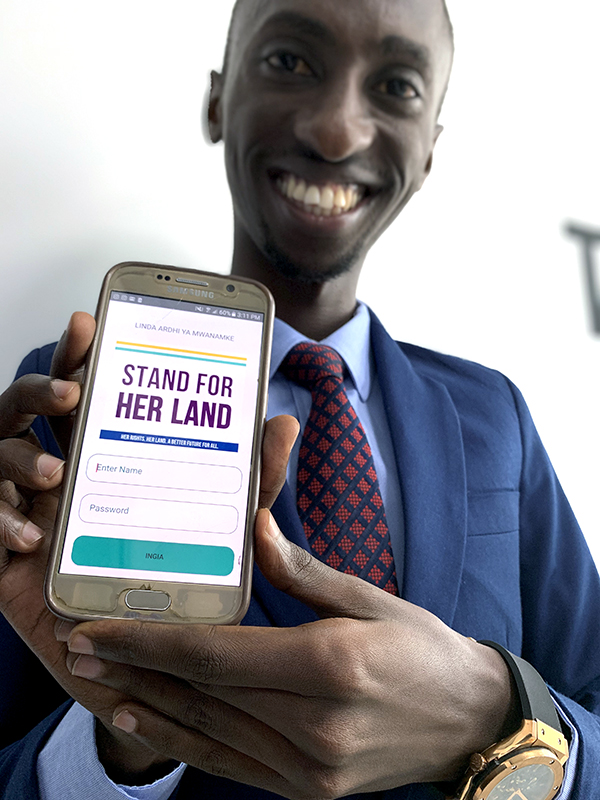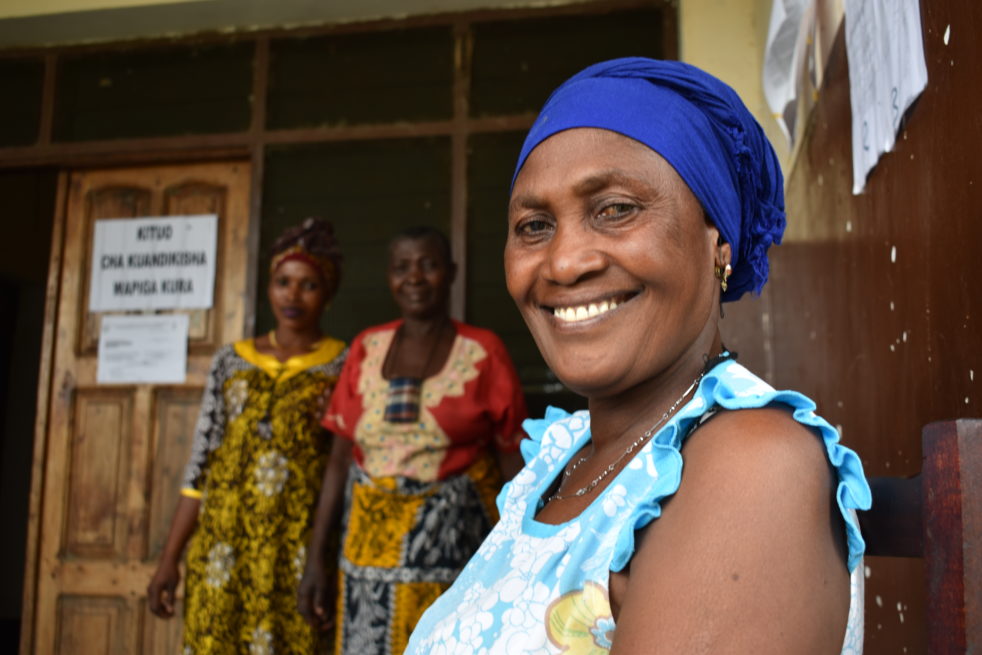When Stand For Her Land Tanzania joined forces with the team that created the mobile legal aid application Sheria Kiganjani – Swahili for ‘Law On Your Palm’ – to develop a tool to monitor and protect women’s land rights in Tanzania, COVID-19 was still the stuff of a Hollywood film. Just months after the S4HL segment of the Sheria Kiganjani application launched, its designers are working with Landesa as Secretariat of the campaign, to integrate messaging on protecting women’s land rights, along with other health and safety information, in the context of the pandemic.
Backing up to the beginning of their story, Sheria Kiganjani’s team of social entrepreneurs, digital designers and legal experts launched their mobile application in late 2018 in order to bring much-needed legal services and information to Tanzanians living in rural communities and areas. Across the country, access to justice and awareness of legal rights related to land, marriage, inheritance and other pressing issues can be in short supply.
Sheria Kiganjani is the first online legal digital platform in Tanzania that bridges that divide by remotely connecting people with legal services and information they need. So far, the application has helped resolve some 1,500 legal cases, nearly a third of which are related to land rights.
One of those cases was that of Saida.
Saida was a young girl when she was forced into marriage at age 13. She didn’t know her rights during her 8-year abusive marriage to a much older man. When he died, her husband’s relatives took everything, even the land, claiming that as a woman she was not entitled to inherit property. Not knowing her rights or able to access or afford a lawyer, she was left without any help.
“Saida and 22 million Tanzanians face a lack of access to justice every day due to financial and other constraints,” said Neema Magimba, Head of Legal for Sheria Kiganjani. “We believe that everybody has the right to access justice easily and affordably which is why we came up with Law On Your Palm.”
Shortly after Stand For Her Land Tanzania was formed in 2019, the campaign worked with Sheria Kiganjani, now a member of the 25-organization strong S4HL Tanzanian coalition, to design a segment for the application dedicated solely to the unique challenges women like Saida face in accessing their secure rights to land.
 After the S4HL segment launched, Campaign Secretariat Landesa Tanzania, in collaboration with Sheria Kiganjani, ran a pilot in three villages, training land rights monitors, also known as community paralegals, on how to use the S4HL segment to collect data on cases that needed attention, how to use the tool to raise women’s awareness of laws that protect their land rights and how to access the justice system to enforce them. Nearly 120 cases have been resolved so far as a result of the pilot, and the team has ambitions to scale nationally as soon as they have the resources to do so.
After the S4HL segment launched, Campaign Secretariat Landesa Tanzania, in collaboration with Sheria Kiganjani, ran a pilot in three villages, training land rights monitors, also known as community paralegals, on how to use the S4HL segment to collect data on cases that needed attention, how to use the tool to raise women’s awareness of laws that protect their land rights and how to access the justice system to enforce them. Nearly 120 cases have been resolved so far as a result of the pilot, and the team has ambitions to scale nationally as soon as they have the resources to do so.
When the coronavirus pandemic struck, S4HL Tanzania members Sheria Kiganjani and Landesa moved quickly to address the new challenge. In late May, community paralegals were trained by telephone on how to raise awareness of, and collect and share information on, the impacts of COVID-19 on women’s – and importantly – widows’ land rights, as they are particularly at risk in the context of crisis.
“Protecting women’s land rights is very challenging in the field now because of the movement restrictions related to the pandemic,” said Khadija Mrisho, land tenure analyst with Landesa and member of the Stand For Her Land Campaign.
“At the same time, people continue to live their daily lives. People will die and women will still be on the verge of losing their inheritance rights because of practices and customs that will still be applied. But now legal services on the ground are even farther out of reach to them because of COVID-19,” she added.
This is the case of a widow who recently reported to the S4HL Tanzania Secretariat that a male relative had illegally claimed her land and property in a region she is currently unable to access because of the pandemic. Campaign members anticipate additional abuses of women’s land rights as the pandemic continues to spread through the country. Inevitably, this will result in an increase of widows, and as consequence, an uptick of women vulnerable to similar land grabs.
Along with folding the new COVID-19 content into the S4HL segment of the application, the team has designed bulk SMS messaging and public service spots that are being broadcast on national radio, in order to reach as many women as possible across the country with vital information about the pandemic, how to prevent its spread and how it relates to women’s land rights.
The creation of the innovative S4HL segment of the Sheria Kiganjani mobile application was made possible by the Bertha Foundation.

